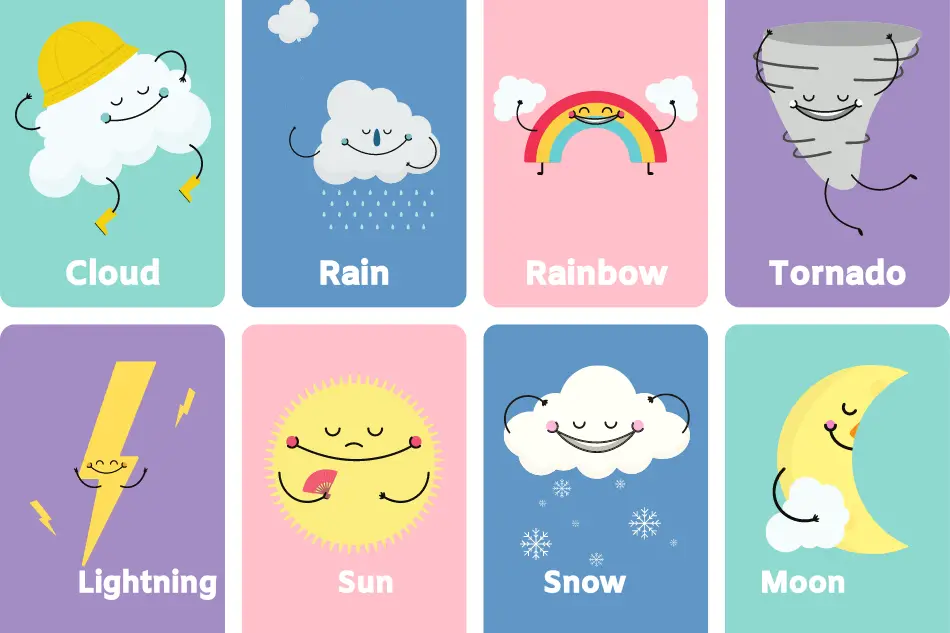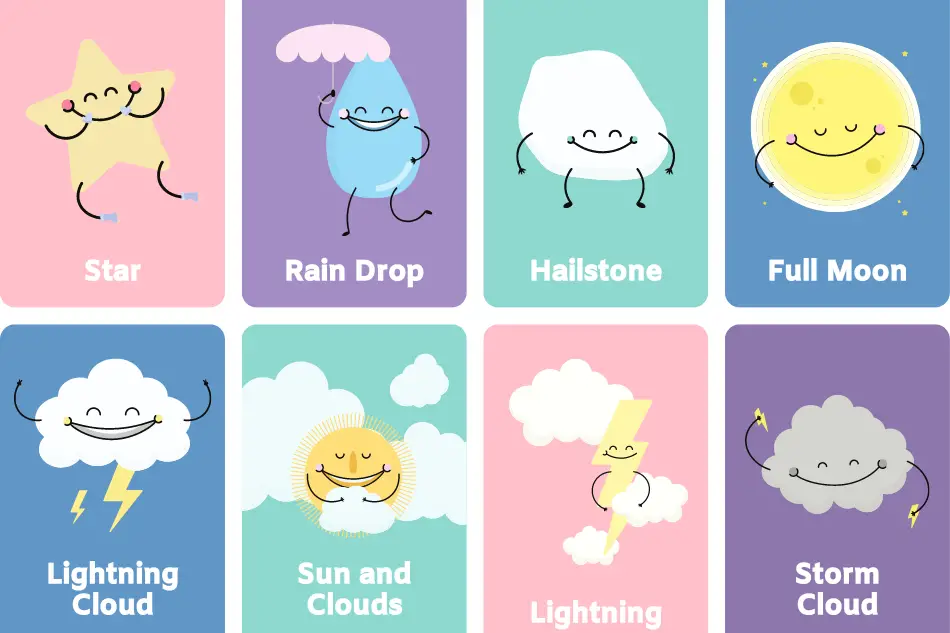Weather is a common topic that most of us talk about in our everyday life. You can start talking to a stranger by asking about the weather as a part of getting to know each other. Even if you feel awkward approaching someone you already know, you can start with the weather as a part of small talk.
You can easily break the ice if you know the appropriate expression to talk to someone about the weather. So, in this post, I share some very useful expressions and tips for talking about the weather in English.
To talk about the weather, you can use adjectives such as sunny, rainy, windy, cloudy, foggy, etc. In addition, there are some phrases and idioms that you can use while talking about the weather in English. Talking about the weather can be a good icebreaker when you hesitate to speak to someone.
Are you looking for a book or a guide to help you learn and improve your English? You may try English Made Easy Volume One: A New ESL Approach: Learning English Through Pictures (Amazon Link).
Table of Contents
- When Can You Talk About the Weather?
- Guide to Asking Someone About the Weather
- How to Describe Weather in Different Seasons
- Common Words Related to Weather
- English Idioms Related to Weather
- Measurement Units for Different Weather Elements
- Guide to Talking about the Weather in Different Tenses
- Sample Conversation: Talking about the Weather in English
- In Conclusion
- 10 Frequently Asked Questions Related to Talking about the Weather in English
When Can You Talk About the Weather?
There are many occasions when you can talk about the weather. For example, suppose you are standing at a bus stop, waiting in the queue for the bus for more than 15 minutes. You can talk to a nearby person about the weather. You can change the boring waiting time into a good time with that person’s company.
Or suppose you want to talk to one of your new colleagues; you can start by discussing the weather as a conversation starter. You can ask about their views on today’s weather or tell them what you think about it too. You can now continue or switch the topic too.
Summing up, you can talk about the weather as a part of a small talk while getting to know each other. It can be a great topic as a conversation starter.
Guide to Asking Someone About the Weather

If we see any changes in the weather or we notice anything significantly different, we usually talk about them. However, we also talk about it when we don’t find any way to start a conversation with someone or don’t see any other topic to discuss. In such situations, we usually ask people questions about the weather.
You may ask someone about the weather in person or over the telephone. Let’s see some examples that you can use to ask someone about the weather.
- How is today’s weather?
- What’s it like out?
- What’s it like out there?
- How do you see today’s weather?
- How is the weather today in your city?
- How was the weather yesterday in your neighborhood?
- Will it be sunny tomorrow? What do you think?
- How cold will this winter be? Any idea about the weather forecast?
- What is the weather like today?
- What was the weather like in your village?
- How was the weather there?
- Will it rain today?
- Nice day, huh?
- How has the weather been in your country recently?
- Is it hot outside today?
- Is it too cold outside today?
- Was there any snowstorm today?
- Does it snow too much in your area?
- Was there a storm this afternoon?
- Did it rain here yesterday?
- Is it going to rain later? What’s your thought?
How to Describe Weather in Different Seasons
Every year, the planet Earth primarily experiences four seasons—spring, summer, autumn, and winter. However, there are some countries where there could be some other seasons.
Spring is called the king of the seasons among the four seasons as the weather gets delightful and warmer compared to winter’s previous season. Trees and other plants grow new leaves. And then comes the summer—the hottest season. In Autumn, the weather gets mild, and winter is the coldest season.
In this section of the post, in the following table, we’ll learn some words/phrases that you can use to describe the weather for any particular season.
| Spring | Summer | Autumn | Winter |
| Bloom Blossom Breeze Bright Drizzle Florescence Floruit Flower Flush Fresh Heyday Highnoon Puddles Thaw | Blue skies Boiling Heatwave In the shade Not a cloud in the sky Scorching Stay out of the sun Sun-kissed | Bundle up Crisp Foggy Getting colder Muddy Rustle of leaves | Below Zero Bitter cold Cold front Howling winds Icy In the dead of winter Toasty Winter blues |
Common Words Related to Weather

| Everyday Terms | Extreme Terms | Temperature |
| Clear Cloudy Dry Foggy Gusty Humid Icy Misty Partly cloudy Partly sunny Rainy Snowy Sunny Windy | Cyclone Downpour Drought Dust storm Flash flood Flood Heatwave Hurricane Lightning Snowstorm Stormy Thunder Thunderstorm Tornado Tsunami Typhoon | Cold Cool Hot Warm Chilly Freezing |
English Idioms Related to Weather
| Weather Idioms | Meaning | Use in Sentences |
| As right as rain | Feeling wholly well or healthy | Ramesh was so ill, but he’s right as rain now. |
| Come rain or shine | Regardless of the weather or circumstances | Come rain or shine; I’ll meet you this weekend. |
| Every cloud has a silver lining | Any unpleasant situation has a positive side too | A silver lining to losing my job is that I’ll now be able to start my own business. |
| Raining cats and dogs | Raining very hard | It’s raining cats and dogs since morning. |
| Lightning-fast | Extremely fast as lightning | He ran lightning-fast in the last race. |
| On cloud nine | Extremely happy | I was on cloud nine after getting the result. |
| To be a breeze | Very easy to do | Don’t worry. The exam will be a breeze. |
| To chase rainbows | Pursuing an illusory goal | I expect you to be more practical. Please stop chasing rainbows. |
| To feel under the weather | Feeling ill | I couldn’t attend the party because I felt under the weather. |
| To have a face like thunder | Look extremely angry | I saw her entering the meeting room, having a face like thunder. |
| To have one’s head in the clouds | Distracted or disconnected from the present situation | He must have had his head in the cloud while doing this. |
| To rain on someone’s parade | To do something that spoils someone’s plans | I’m sorry to rain on your parade, but you cannot enter the ballroom without maintaining a proper dress code. |
| To steal someone’s thunder | To do something that someone else was going to do | You stole my thunder when you said you had already prepared the presentation. |
| To take a rain check | Politely decline an offer, with the implication that one may take it up later | My boss wanted me to visit the factory, but I took a rain check. |
| To throw caution to the wind | Act in a completely reckless manner | You should not always throw caution to the wind and do whatever you want to. |
Measurement Units for Different Weather Elements
| Elements of Weather | Measurement Unit |
| Air temperature | Degrees celsius (°c) Kelvins (k) Fahrenheit (ºf) |
| Precipitation (Rain & Snow) | Millimeters (mm) Kilograms per square meter (kg/sq m) Inches (in) |
| Wind speed | Meters per second (m/s) Miles per hour (mph) Kilometers per hour (kph) Knots (knt = 0.514 m/s, 1.15078 mph, 1.852 kph, 1 nautical mile per hour) Beaufort (beaufort wind force scale) |
| Relative humidity | Percent (%) |
| Cloud height | Meters (m) Feet (ft). |
| Evaporation | Millimeters (mm) |
Guide to Talking about the Weather in Different Tenses
While discussing the weather, you may need to talk about today’s, tomorrow’s, or yesterday’s weather. In English grammar, there are different tenses. In this part of the post, we’ll learn how to discuss the weather in different tenses.
Present Simple
(Subject + present form of the verb + extension)
- It is cold today.
- It is scorching hot today.
- It is chilling cold today.
- The weather is misty here now.
- The sky is covered with clouds.
Present Continuous
(Subject + helping verb + present form of the verb + ing + extension)
- It’s raining cats and dogs.
- It’s snowing.
- A heatwave is going on.
- It’s chilling outside.
Past Simple
(Subject + past form of the verb + extension)
- It rained yesterday.
- It was too hot last Wednesday.
- The city was covered with snow yesterday.
- There was a flash flood last year.
- The sky was clear yesterday.
Present Perfect Continuous
(Subject + has/have been+ present form of the verb + ing + extension)
- It has been raining since morning.
- It has been snowing for the last two days.
- There has been scorching heat since last month.
Future Simple
(Subject + will + present form of the verb + extension)
- It will rain tomorrow.
- The temperature will be high tomorrow.
- It will be windy next Thursday.
- According to the weather forecast, there will be a flood next week.
- The country will encounter a cyclone at the end of this year.
Sample Conversation: Talking about the Weather in English
Situation: Two coworkers, Jake and Mia, are at the office pantry, making coffee. They strike up a conversation about the sudden change in weather.
Jake: Wow, it’s really pouring outside, isn’t it?
Mia: It sure is. I didn’t expect rain today. The morning started off so sunny and clear.
Jake: That’s true. I heard there’s a cold front coming through. We might even get some snow by the weekend.
Mia: Really? That would be something. I better get my winter gear ready then. Thanks for the heads-up!
In Conclusion
Talking about the weather can be an excellent topic for small talk. While talking about the weather, you can use some adjectives to describe precisely what the weather is like.
In this post, I talked about everything in detail that can help you to talk about the weather. If you still have questions about this, you can comment below.
Thank you!
Happy learning.
10 Frequently Asked Questions Related to Talking about the Weather in English
1. Why is the weather a popular topic of conversation?
Discussing the weather is a neutral topic that provides an easy way to initiate or sustain a conversation, especially with acquaintances or strangers.
2. What are some common phrases to talk about the weather?
Phrases like “It’s a beautiful day,” “Looks like rain,” “It’s chilly outside,” or “I heard there’s a storm coming” are commonly used.
3. How can tone influence the way I talk about the weather?
Using a cheerful or conversational tone can make the discussion about the weather feel light and casual, making it a suitable icebreaker.
4. Can talking about the weather lead to deeper conversations?
Yes, discussing the weather can often segue into topics like plans for the weekend, outdoor activities, or personal experiences related to weather events.
5. How can I respond when someone comments on the weather?
Responses like “I know, right?”, “I love this kind of weather,” or “It’s quite a change from yesterday” can keep the conversation flowing.
6. Is it appropriate to complain about the weather?
While everyone has personal preferences, it’s good to be mindful of the tone and context. Light-hearted complaints can be relatable, but constant negativity might not be well-received.
7. How can I discuss weather predictions?
Phrases like “The forecast says it’ll clear up by afternoon” or “I heard we’re in for a cold spell” can introduce predictions.
8. Is it okay to talk about the weather in a professional setting?
Absolutely. Discussing the weather can be a suitable small-talk topic before delving into business matters or during breaks.
9. How can cultural nuances influence discussions about the weather?
In some cultures, talking about the weather is a staple of small talk, while in others, it might not be as common. Being aware of cultural norms can guide the conversation.
10. Are there any idioms or expressions related to the weather in English?
Yes, there are many idioms like “Under the weather” (feeling ill), “Break the ice” (start a conversation), or “It’s raining cats and dogs” (heavy rain).





